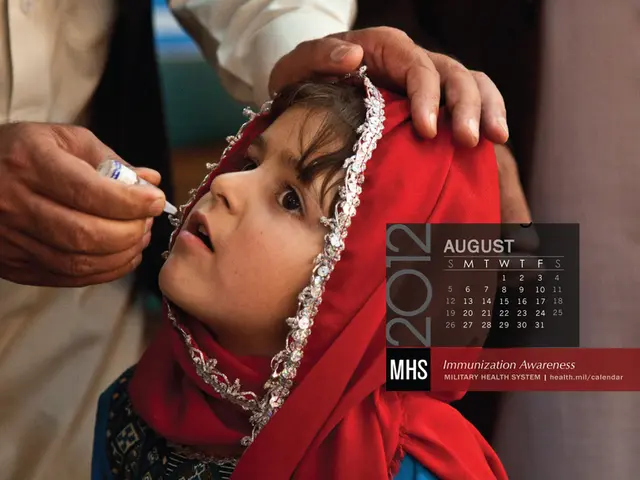Increase in cases of measles, rubella, and pertussis (whooping cough) in Russia
Rampant Childhood Infections on the Rise Across Russia
Picture this: A sea of red rashes across the nation, signs of measles, rubella, and whooping cough taking over. That's the grim reality in modern-day Russia. Kommersant reports a significant increase in these diseases, as per a report by Rospotrebnadzor. Last year, the country registered 22,455 cases of measles - eleven times greater than the average multi-year indicator. Rubella cases increased by a whopping six times, and whooping cough by 4.5 times. These infections don't only pose threats to kids - they can also wreak havoc on adults, with doctors warning about the potential consequences. So, why are these diseases back on the rise, and what's the best way for both kids and adults to protect themselves? KP dives in.
Spiking Infection Rates
- "The current measles infection rate is record-breaking after several decades," reveals immunologist and healthcare expert, Dr. Nikolai Kрючков, on radio "Komsomolskaya Pravda." He adds, "The main reason for this increase in infections is a drop in child vaccination. This, mostly due to the COVID-19 pandemic, with scheduled medical procedures delayed temporarily for epidemiological safety reasons." Even after vaccinations resumed, some parents remained hesitant to bring their children to clinics due to fear of catching the coronavirus, he explains.
THE SOCIETY'S BLUEPRINTChildhood infections are incredibly contagious - but if nearly all children are vaccinated, societies can achieve a high level of collective immunity. This significantly minimizes individual risks for each person. So, in peaceful times, there's no urgent need for widespread adult revaccination. However, with missed vaccinations in children causing infections to rise, the risks also escalate for adults, especially residents of densely populated cities, notes Kрючkov.
The Road to Protection
Follow the lead of the National Calendar of Preventive Vaccinations (NCP) for childhood: vaccinations for these diseases are recommended at specified times. But the game is more complex for adults.
- After childhood vaccination against measles, immunity endures a lifetime for some, but not for others. The arrival of COVID-19 makes this less common. There's a hypothesis that the coronavirus might weaken immune memory, says Dr. Yevgeny Timakov, an infectious disease specialist and candidate of medical sciences. Hence, for adults aged 25 and above, he recommends getting revaccinated against measles once.
To Revaccinate or Not to Revaccinate?
Now, if you're wondering how to access these revaccinations, here's some useful information:
- Adults aged 18 to 35 may receive free revaccination for measles if they:
- Have never been ill.
- Haven't been vaccinated.
- Have only received one shot.
- Have no records of measles vaccinations.
- Adults aged 36 to 55, who belong to risk groups (medical workers, educators, employees of trade, transport, etc.), may also receive free revaccination if they:
- Have never been ill.
- Haven't been vaccinated.
- Have only received one shot.
- Have no records of measles vaccinations.
In other cases, federal legislation does not guarantee free revaccination for adults. But don't worry; regional authorities, large corporations, and other organizations may allocate funds for revaccination for residents or company employees. Find out about such options by reaching out to your HR department or calling your insurance company's hotline.
"100-Day Cough"
Whooping cough, often nicknamed "100-day cough," requires revaccination every 15-20 years for adults, as immunity against it weakens over time, explains immunologist Nikolai Kryuchkov. Sadly, we often observe waning immunity to pertussis in adults, as confirmed by Dr. Yevgeny Timakov, a practicing infectious disease physician. He emphasizes that adults should get revaccinated every ten years.
Presently, pertussis vaccination for adults is not listed in the National Calendar of Preventive Vaccinations. As such, you'll have to pay for your vaccination (except if employers or local authorities allocate funds - see above). Specialists suggest that pertussis is vaccinated against with a three-component vaccine, which also protects against diphtheria and tetanus (revaccination is recommended for these diseases every ten years). However, the classic childhood DTP vaccine is not designed for adults. Instead, there's a special vaccine with a reduced concentration of antigens - the combined acellular vaccine.
Regarding rubella, it is provided for in the NCP for a specific group of adults:
- Women aged 18 to 25 may receive revaccination against rubella if they:
- Have not previously been infected.
- Have not been vaccinated.
- Have only received one shot.
- Have no information about vaccinations against rubella.
But worry not, future mothers of any age and adult members of their families should also consider getting revaccinated, thanks to the current rise in morbidity, suggests Kryuchkov.
Antibody Tests and Their Purpose
Many medical laboratories offer antibody tests for measles to determine whether immunity has been maintained. These tests might be useful for those who are unsure about their childhood vaccinations or want to check if their immune protection against measles remains strong after recovering from COVID-19.
In the view of Dr. Timakov, there's no pressing need for such checks. "If you're unsure about your childhood vaccinations or are 25 years or older, I would advise getting vaccinated without hesitation and skip the testing," the doctor shares. "There'll be no harm, and it's absolutely safe. Even if you still have antibodies, the process is entirely risk-free."
- The increase in childhood infections isn't only a concern for young individuals, as these diseases can also impact adults, with potential severe consequences.
- In order to achieve a high level of collective immunity and minimize individual risks, nearly all children should be vaccinated at specified times, as recommended by the National Calendar of Preventive Vaccinations (NCP).
- Even though some individuals may have lifelong immunity after childhood vaccination against measles, others might require revaccination, especially since the arrival of COVID-19, which could potentially weaken immune memory.
- For adults aged 25 and above, getting revaccinated against measles once is recommended, according to infectious disease specialist Dr. Yevgeny Timakov.
- To access free revaccination for measles, adults aged 18 to 35 must meet certain conditions, such as having no records of measles vaccinations or having only received one shot.
- Adults aged 36 to 55 who belong to risk groups may also receive free revaccination if they haven't been vaccinated or have only received one shot.
- For pertussis, adults require revaccination every 10 to 20 years, as their immunity weakens over time, and they should get revaccinated every ten years, according to immunologist Nikolai Kryuchkov.
- Pertussis vaccination for adults isn't currently listed in the National Calendar of Preventive Vaccinations, so vaccination may come at a cost or may be covered by employers or local authorities.
- Regarding rubella, women aged 18 to 25 may receive revaccination if they have not been infected or vaccinated, and there's a recommendation for future mothers and adult family members to consider getting revaccinated due to the current infection rise.
- Several medical laboratories offer antibody tests for measles to determine if individuals have maintained their immunity. These tests could be useful for those unsure about their childhood vaccinations or those who have recovered from COVID-19.
- With the current increase in childhood infections, it's essential to prioritize workplace wellness and provide educational resources to employees about available vaccinations, revaccinations, and other health-and-wellness related topics such as fitness-and-exercise, nutrition, and mental-health.
- Healthcare experts suggest that men should also prioritize their health, with specific recommendations for mens-health, such as regular check-ups and screenings, and adopting a healthy lifestyle that includes proper nutrition, fitness, and stress management.
- To address chronic diseases, the focus should be on early detection, management, and prevention, such as in the case of skin-care, which involves taking care of the skin to maintain its health and prevent skin-conditions.
- In addition, it's crucial to prioritize aging well by adopting a balanced diet, regular exercise, and other therapies-and-treatments to manage medical-conditions like neurological-disorders, autoimmune-disorders, cardiovascular-health, and cancer, which may become more common with aging.
- Expectant mothers should also prioritize womens-health during pregnancy, including prenatal care, nutritional needs, and potential complications related to pregnancy, such as complications with eye-health, hearing, and skin-care.
- Parenting responsibilities also come with the task of teaching kids about health-and-wellness, ensuring they maintain proper hygiene, manage weight-management, and develop a healthy lifestyle that includes fitness-and-exercise, nutrition, mental-health, and sexual-health education.








